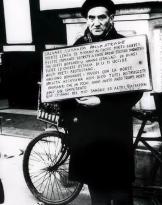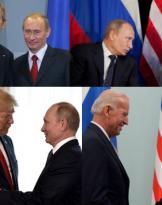History is a constellation of wars and battles and if you look even better, in every battle and in every war we could see the face of a soldier fighting us.
We have seen what happens to a warrior's body during the fight, but afterwards?
How does the human body react after a battle or a gunfight?
Ranger Colonel Dave Grossman, who conducted research to find out how a soldier's body and mind react to a gunfight or a traumatic event, has largely followed these questions.
Having ascertained that our body, subjected to intense combat stress, is totally oriented towards survival and avoiding over-loading of the five senses; let's see how this reacts after the fight has come to an end.
The moment immediately following the fight is defined as the moment of greatest vulnerability of a soldier.
During the battle the soldier and his sympathetic nervous system face the stress of this derivative, the body receives continuous adrenaline discharges and is subjected to considerable tension.
At the end of this condition the SNP takes over the SNP - parasympathetic nervous system - which in antagonism to the first relaxes the body and returns it to a condition of normality.
This very strong parasympathetic collapse leads to a very strong fatigue, it becomes detached and free of stimuli.
It is obvious that as long as this situation occurs while we are comfortably lying on the couch at home everything is under control, but when you are in between a battle and another can be very dangerous.
Unfortunately this is not a mechanism that we can control in any way, our nervous system works autonomously regardless of the conditions that surround us.
So, what should a good commander do?
In the first analysis, an adequate shift between a firefight and another is essential.
If men were to continue after a battle to stem the enemy's advance then, the parasympathetic collapse would make them vulnerable. Men rested and led by the SNS will respond better to fire and will be more vigilant, running less risk.
A second method widely used to avoid falling victim to this post victory vulnerability is what Americans call LACE (Liquids, Ammunitions, Casualities, Equipment).
With this acronym the military remember that after a battle they must redistribute the ammunition, drink a lot, treat the wounded, provide for the fallen (or the wounded) and check their equipment.
In this way the soldiers learn - both during training and in reality - to manage the moment after the clash in a useful and constructive way.
We have seen how the parasympathetic collapse risks becoming a big problem after a battle, but what happens when this battle for which we are prepared is not fought?
It's like a bow that stretches but never blows its arrow.
From the outside you can think that for a warrior not fighting a battle is almost a favor, in reality these soldiers enter the "combat" mode well before having a real fight.
The mental predisposition and the activation of the senses is followed by the adrenaline rush that the body needs to manage the situation. When this adrenaline is not vented in a direct confrontation then it must necessarily be vented (or expelled) in some other way.
The best and healthiest method to expel excess adrenaline is to make a healthy run of a few kilometers or an intensive training session.
 Physical effort will help our body to relax and therefore rest.
Physical effort will help our body to relax and therefore rest.
Some veterans (police or military alike) use far less orthodox methods to dispose of adrenaline. Two of these are alcohol and nicotine intake.
Erroneously it is thought that these two substances can help our body to remarry better, despite the adrenaline that we still have in circulation. Mistaken.
Several scientific tests of undoubted value have already experimented that alcohol and nicotine have no effect on sleep and on the disposal of residual adrenaline in the body.
The adrenaline disposal we talked about is directly related to another post-combat problem: sleep.
Sleep disorders are common in the military and police forces; massacring shifts, families that require attention and personal commitments overshadow an adequate rest.
It would be great if we could have days of 72 hours and use them all to meet our commitments and needs, but at some point your body will cry out revenge and reclaim its hours of rest.
Sleep deprivation for our body is absolutely detrimental and it is also detrimental to workplace performance: reaction times doubled, slowness in information processing and judgment. Not to mention vigilance and the sudden loss of calm and motivation.
It is no coincidence that the persistence of lack of sleep in prisoners is considered to all effects torture.
After the battle or one's work shift is absolutely necessary for the body of any warrior to rest properly.
A few nights without sleep will not destroy our body which, with adequate training, will be able to cope with lack of sleep, but the voluntary extension of this condition is inadvisable.
Today there has been a progressive substitution of sleep with video games or internet connections from operating theaters.
The soldiers instead of sleeping prefer to play video games (almost always violent) or surf the net for hours, this form of escape from reality as well as weaken their body can also wear their minds in the long run.
The Americans during and after the experience in Afghanistan and Iraq are seriously reevaluating their approach to the "sleep issue" because they have understood its potentially devastating effects.
 What has been explained here are the effects that our body undergoes after engaging in battles or gun battles.
What has been explained here are the effects that our body undergoes after engaging in battles or gun battles.
Also of greater interest are the damages that the mind can suffer after a lethal confrontation, that this happens in the streets of our city or on the other side of the world.
Killing or seeing someone who kills is always a huge disturbance by virtue of Universal Human Phobia.
The disturbance that a human being who kills another human being causes in our mind is immense and a need for a series of countermeasures so that no more serious problems such as post-traumatic stress disorder can arise.
After a fight or a battle it is necessary that once back to the base you will perform what Colonel Grossman calls debriefing.
This strange name borrowed from English is nothing but a discussion that should help the participants to accept what happened and why not to draw some useful lessons for the future.
It is not advisable to make this meeting immediately after the event, because - by virtue of what was said before - the memory in case of stress and trauma can play a bad roll even to the most experienced soldier.
It would be optimal to perform this operation after a night of sleep because it helps relaxation and long-term memorization of memories.
Strongly discouraged is to tell the event to friends and relatives immediately after the fact, or drink alcohol and make use of altering substances, because they do not help the resurfacing of memories and their memorization.
Il debriefing it is not necessarily a fine instrument of psychology but it is also something informal as a chat between colleagues after a critical event.
When the support that is required by the circumstances is more elaborate then the debriefing it becomes a more prudent and structured instrument so as to offer maximum effectiveness to those who participate in it.
During these meetings there is always an old "veteran" who explains to his interlocutors what is normal and what is not. The most embarrassing physiological reactions (relaxation of the sphincters, tremors and dumbness) and the lesser known reactions of combat stress can emerge in this context, making men understand that some inconveniences are quite natural.

But what can never be present at one debriefing it's anxiety. The latter does not favor anyone and those who are victims only risk mixing their memories. When anxiety occurs at these therapeutic meetings, then it is important that everything stops for a few minutes and the so-called "tactical breathing" is practiced, a type of deep breathing that immediately helps to relax and regain control of oneself.
But what is the purpose of this operation? There are two important functions that the debriefing takes: the first is training and the second is re-tuning with oneself.
The training function of the debriefing it is also called after action review and is based on the concept known to all of the "misunderstanding we learn".
Analyzing the incident with all its participants highlight any errors to remedy them in future operations or just to treasure them.
This function is fundamental, especially during the training phase, when analyzing errors so as not to repeat them on a real field.
The second function is that which the debriefing offers to those who participate by reconstructing point by point the event.
We must remember that some of the most important cognitive aspects after a traumatic event are perceptual distortion and distortion of memories, this meeting helps us to really understand how events have gone and to restore the integrity of the group.
Moreover, immediately after the traumatic event, our mind has a purely selfish orientation, as it is projected to the survival of our person.
"Thank goodness it was not up to me!" It's one of the first things we think of when we see a body or hear the news of a car accident. It's a completely natural situation even when a friend or colleague dies.
If you have an emotional bond with the deceased or the wounded, this phrase - automatic - can lead us to have severe personal turmoil and can lead us to assume the guilt of the incident.

"It's all my fault!" it is the second sentence that is said more often even if materially we could not do anything to avoid the traumatic event.
Il debriefing reconstructing what happened makes us really understand where we are wrong and allows us to share the pain with the community we are part of.
When the pain is shared it is as if we materially give a little bit of our pain to the others so that it becomes more bearable for us.
Despite what has just been said, the habit of debriefing it is slowly being lost in ground troops due to an increasingly tight type of war and without time limits.
The use of night-time equipment and the need for a surprise effect against asymmetric enemies has prevented the possibility of hours of rest in order to talk about what happens on the field.
In the eyes of the most intransigent supporters of the theory "talking about feelings is for women" it is good to remember that the debriefing not only for themselves but for their companions. Someone could do well to retrace the events and know that he had completely normal reactions to stress.
You just have to decide whether to attend the meeting at the cost of looking like a sissy or not to participate and leave your colleague to drown in guilt.
If you wanted to make a small note of an economic nature the debriefing it costs practically nothing, if not a few hours of time, not practicing it could create depressed, stressed and troubled men that should be followed by specialized doctors.
In the United States the post-traumatic stress disorder is treated with devastating effects without really tackling the problem with a targeted analysis followed by psychiatrists and psychologists.
In Italy we are still convinced that the disturbance created by combat stress can be solved with a few more bending and a little 'healthy will.
Continuing along this line, we will look into the eyes of the soldiers and we will continue to see a deep disturbance in them.
Because "let's arm and fight" is always a good motto, but how many are willing to face the consequences of those departures?
Breaking the chains of the stereotype and overcoming the fears is never easy, but in this case there are thousands of lives at stake that deserve to be lived and not sacrificed.
The only sacrifice that these soldiers owe to their country is to leave when they are called, the sacrifice that is up to us is to listen to what they have experienced.
(Click here for the first part: "Bodies and minds in combat: imperfect weapon?")

(photo: US DoD)












